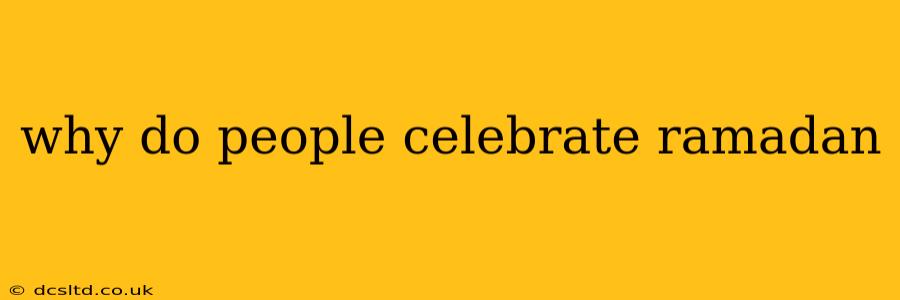Ramadan, the ninth month of the Islamic lunar calendar, is a time of immense spiritual significance for Muslims worldwide. It's a period of fasting, reflection, and renewed commitment to faith, marked by profound personal and communal observances. But why do people celebrate this month with such dedication? The answer lies in its deep roots in Islamic teachings and its profound impact on the lives of believers.
What is the Purpose of Ramadan Fasting?
The central practice of Ramadan is Sawm, or fasting, abstaining from food and drink from dawn until sunset. This isn't merely a physical act; it's a spiritual discipline designed to cultivate empathy, self-discipline, and a deeper connection with God (Allah). By experiencing hunger and thirst, Muslims are reminded of the plight of the less fortunate, fostering compassion and generosity. This self-imposed hardship strengthens inner strength and resilience.
What are the Spiritual Benefits of Ramadan?
Beyond the physical act of fasting, Ramadan offers a wealth of spiritual benefits:
- Increased Spiritual Awareness: The focus on prayer, reflection, and recitation of the Quran (the holy book of Islam) leads to heightened spiritual awareness and a closer relationship with God.
- Self-Improvement: Fasting provides an opportunity for self-reflection and introspection, allowing individuals to identify and address personal flaws and strive for moral betterment.
- Enhanced Empathy and Compassion: By experiencing hunger and thirst, Muslims develop greater empathy for those less fortunate and are encouraged to engage in charitable giving.
- Strengthened Community Bonds: Ramadan fosters a strong sense of community as Muslims gather for prayers, share meals (Iftar), and engage in communal acts of worship.
What Happens During Ramadan?
Ramadan is not just about fasting; it's a holistic experience encompassing various aspects of life:
- Increased Prayer: Muslims increase their frequency and intensity of prayer, both individually and in congregation.
- Quran Recitation: The Quran is recited extensively during Ramadan, fostering a deeper understanding of its teachings.
- Charity and Giving (Zakat): Generosity and charitable giving are emphasized, with many Muslims donating to the needy and engaging in acts of service.
- Iftar Meals: The breaking of the fast at sunset (Iftar) is a special time for families and communities to gather, share food, and celebrate together.
- Taraweeh Prayers: Special nightly prayers (Taraweeh) are performed in mosques, often featuring extended recitations of the Quran.
Is Ramadan Obligatory?
Ramadan fasting is one of the five pillars of Islam, making it an obligatory act of worship for adult Muslims who are physically and mentally capable. However, exceptions are made for those who are ill, traveling, pregnant, breastfeeding, or facing other extenuating circumstances.
How is Ramadan Celebrated Around the World?
While the core tenets of Ramadan remain consistent globally, the celebrations vary across different cultures and regions. From the bustling night markets of Morocco to the elaborate Iftar feasts in Indonesia, the celebrations reflect the rich diversity of the Muslim world. The essence, however, remains the same: a period of spiritual renewal, introspection, and strengthened community bonds.
What are the Key Differences Between Ramadan and Other Religious Observances?
Ramadan differs from other religious observances in its unique emphasis on fasting as a central spiritual practice. While other religions may include periods of fasting, the intensity and the specific spiritual focus of Ramadan's fasting are quite distinct.
In essence, Ramadan is a month of profound spiritual significance for Muslims, a time for self-reflection, personal growth, and strengthening communal ties through shared experiences and devotion. Its impact extends far beyond the month itself, shaping the lives of believers throughout the year.
